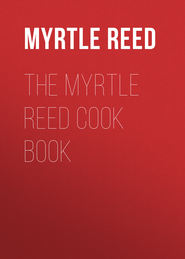По всем вопросам обращайтесь на: info@litportal.ru
(©) 2003-2024.
✖
The Shadow of Victory: A Romance of Fort Dearborn
Настройки чтения
Размер шрифта
Высота строк
Поля
Seemingly by preconcerted arrangement, the pack-trains arrived during the last week of March. Twenty horses came from the Illinois and Kankakee districts, and seventeen from the Rock River, loaded with skins. For a year the Indians in the Mississippi valley had exchanged peltries for provisions, beads, and liquor. Five Canadian engagés, with rude camping outfits strapped to their backs, walked in leisurely fashion beside the horses.
The skins were stored in the Agency House, awaiting the schooner from the American Fur Company at Fort Mackinac. The horses were tethered on the plains near the Fort, and business was carried on there, except at meal-time, when eight hungry men and four children taxed Mrs. Mackenzie's strength to the utmost.
Three days later the schooner was sighted, bearing down from the north, and, as it was practically the only event of the year, the settlement went in force to the lake shore to see it come in. A corporal's guard, bitterly complaining, was left at the Fort.
With the wind filling her sails, the ship steered south-west until she reached a point exactly opposite the mouth of the river, then turned swiftly, like a bird, and came toward the cheering crowd on shore. The waves broke in foam upon her keel, and amid the shouts of command and welcome and the clatter of the rigging, came the song of a voyageur, in a clear, high tenor, which won a separate recognition.
"More men to feed," sighed Mrs. Mackenzie.
"Never mind, Aunt Eleanor," said Forsyth, "I'm going to help you."
"Me, too! Me, too!" cried the children.
Mrs. Howard and Mrs. Franklin promptly offered their services, and Ronald put an affectionate arm about her waist. "Don't bother, Aunt Eleanor," he said; "you've got me."
Forsyth was surprised at the speech, and still more astonished when the Ensign made it good during the hard days that followed. He tied a big blue apron under his arms, unmindful of its ridiculous flapping about his knees, set his cap on the back of his head, rolled up his sleeves, and announced that he was ready for work. Forsyth helped him split wood, bring water, make fires, and wash dishes until his head swam with weariness; but through it all, Ronald was serene and untroubled, keeping up a cheery whistle and a fusillade of comment and observation which lightened the situation exceedingly.
Mrs. Mackenzie found herself taking orders from the young soldier who was the self-constituted master of the cuisine, and learned to obey without question, even when she was sent to her easy-chair early in the morning and kept there during the greater part of the day.
Mrs. Howard and Mrs. Franklin were unceremoniously put out. "Kitty and Mamie," pleaded the Ensign, in an aggravating falsetto, "will you please run home? Your mother has enough to feed without your trotting in to meals." He accompanied the request with a threatening wave of a spoon filled with pancake batter, which had the desired effect.
"There," he said, "I've finally chased 'em out. I do hate to have women bothering around me, don't you, Rob?"
"I've never been bothered," laughed Forsyth; "at least, not in that way."
Swiftly upon the heels of the schooner came the boats from Milwaukee. The cargoes were landed on the lake shore and taken to the Agency by the pack-horses. All day the patient beasts plodded to and fro, carrying furs to the shore, and provisions, blankets, calicoes, prints, and a thousand other things to the storehouse. The small boats from the ship plied back and forth, landing the cargo and taking back peltries, and the men worked from sunrise to sunset.
An unusual amount of friction developed between the several engagés and voyageurs, and various disputes were settled on the spot with bare fists. Chandonnais had a rare talent for getting into trouble, and few indeed were the fights in which he did not eventually take a leading part.
"Chan," said Mackenzie, at length, "you ain't paid to fight, but to work; and if there's any more of this I'll send you to one of the other posts." This threat was always effectual, for some reason which the trader did not seek to know.
At last the tired horses finished their task and every skin was in the hold of the schooner. The Agency House was filled to bursting with the materials of trade, and a small but precious horde of gold pieces, representing the balance in his favour, was hidden in Mackenzie's leather belt.
There was a day of rest for everybody except Mrs. Mackenzie and her assistants; then Chandonnais surprised the trader by a demand for his year's wages.
"Why, Chan!" exclaimed Mackenzie, "don't you want me to keep it for you as I've been a-doing?"
The half-breed shook his head sullenly.
"Well, it's yours, and you can do just as you please with it, but I guess you'll be sorry for it later. Mind, now, this is all till next year – you don't get any advance."
Chan agreed, and Mackenzie called Robert to witness the transaction. Five shining ten-dollar gold pieces were counted out into a grimy paw that closed upon them quickly, as if in fear.
"Fifty dollars and found," Mackenzie explained to Robert as Chandonnais went away. "I don't grudge it neither, for he's a good boy when he ain't fighting."
The schooner was lying by for a favouring wind, and the pack-trains were waiting to give the horses a needed rest. Mackenzie had made an equitable division of the stores at the Agency, and each of the engagés knew exactly what he was to take back with him, and the approximate value of each article in terms of peltries. During the day liquor flowed freely, and at night there was a barbecue on the lake shore.
A young ox was roasted whole, in front of a huge fire which could be seen for miles around. Forsyth and the Mackenzies, with their four children, and the officers and men from the Fort with their wives and families, sat around on the sand and took part in the celebration. A single sentinel patrolled the Fort, cursing his luck, and a few stray Indians watched the festive scene from afar.
Chandonnais had his violin, and the fine tenor of the voyageur was lifted in song – old French chansons and garbled melodies of the day. The strings of the fiddle were twanged in delicate accompaniment until the singer struck up Yankee Doodle, which, owing to the French accent and the peculiar distortion of the tune, was taken by the company as a humorous performance.
The men ate hungrily, and at last even Ronald was satisfied. Then a sudden thought struck him, and he went over to speak to Captain Franklin. "Good-bye, everybody," he shouted.
"Where are you going?" asked Forsyth.
"I'm going back to relieve that poor devil at the Fort."
In spite of a chorus of protests, he went, and the lone sentry appeared presently, grinning from ear to ear, to feast and revel while his superior officer kept guard with a bayonet over his shoulder. It was such trifles as this which endeared Ronald to the soldiers. There was not a man in barracks who would not have followed him cheerfully to certain death.
The fire died down and some of the men slept peacefully on the sand, while others yawned openly. Chandonnais improvised a weird melody which was strangely out of keeping. There was something uncanny in the air which accorded ill with the festival, and it seemed only fitting and proper when Mad Margaret materialised from the outer darkness and came into the centre of the group.
A hush came over the company and some of the newcomers, who had heard wild tales of Margaret, were secretly afraid. Chandonnais kept on playing, and she watched him with wide, wondering eyes. For a long time the magic of the strings kept her quiet, then she began to mutter to herself uneasily.
"Margaret," said Mackenzie, gently, "come here."
Chandonnais threw down his violin with a gesture of impatience, beckoned to the singer, and walked away rapidly. The voyageur rose lazily, yawned, and followed him with seeming indifference.
Margaret's eyes were shining like the live coals which gleamed in the ashes. She leaned forward and picked up the violin, stroking it and crooning to it as if it were a child.
"Margaret," said Mackenzie again, "come here."
She went to him with a dog-like, unquestioning obedience, and sat down in front of him. Mrs. Mackenzie was next to her husband, with the baby in her lap, and Mrs. Howard sat on her mother's left. The Lieutenant was talking with Forsyth and the Captain, and at a little distance, on Mackenzie's right, sat Doctor Norton.
A sharp cry came from the violin, where Margaret's fingers tightened on the strings. "I see blood," she said, – "much blood, then fire, and afterward peace."
No one spoke, and Margaret mumbled to herself, then pounced upon Katherine. She took her by the shoulders and shook her roughly. "You will have your heart's desire," she cried, "at the time of the blood, but sorrow will come with it!"
Before any one else had time to move, Doctor Norton caught Margaret and pulled her away.
"Oh," she shrieked, shaking her fist in his face, "the Red Death has its fingers at your throat!"
Mackenzie picked up the violin, found the bow in the darkness, and began to play – rudely enough, it is true, but in some semblance of rhythm. Margaret quieted almost immediately, and sat down in front of him, rocking back and forth in time with the faltering tune.
"Aunt Eleanor," said Forsyth, over her shoulder, "don't you think I'd better take the children home?"
"Yes, please, if you will."
She put the sleeping baby into his arms, woke Maria Indiana, and directed Ellen and Johnny to go with "Cousin Rob." The procession moved slowly, for the baby was heavy, and the other children were inclined to linger. Mad Margaret had a terrible fascination for them.
As they passed a grove of cottonwoods, angry voices came from the thicket, in a mongrel French which had but little in common with that Robert had learned at Yale.
"It is abominable," cried Chandonnais. "It is too much!"
"So?" laughed the other, mockingly; "and only last year you told me you would pay the price!"
"A year's wages for a common crucifix!"
"It is no common crucifix. It is of solid silver, and it is from the old mission, where it was blessed by Père Marquette himself."











